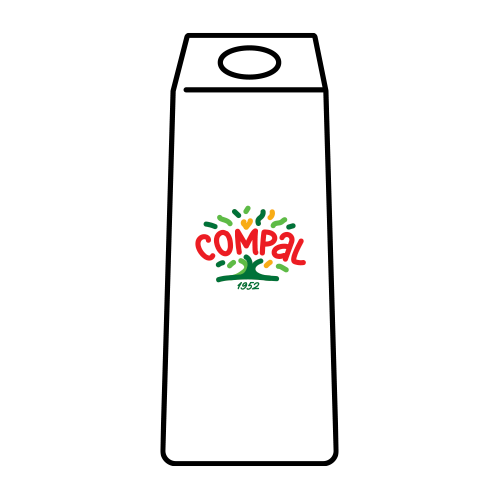
Tetra Pak 1L
INGREDIENTS AND ALLERGENS
Ingredients
Pineapple juice: made from concentrate, water, sugar, acidity regulator: citric acid and ascorbic acid (vitamin C).
Conservation conditions
Once opened, store in a refrigerator.
Other information
Fruit content: at least 50%.
NUTRITIONAL TABLE
Nutritional info per 100 ml
| Energy | 165kJ - 39kcal |
| Lipids | <0,5g |
| - of which saturated | <0,1g |
| Carbohydrates | 9.5g |
| - of which sugars | 9.4g |
| Fibre | - |
| Proteins | <0,5g |
| Salt | <0,1g |
| Vitamin C | 6mg (7,5% VRN*) |
* Nutrient Reference Value
Other Flavours
JUICES & NECTARES
QUESTIONS AND CURIOSITIES
Do your juices and nectars spoil outside the cold?
Our juices and nectars are natural and made from fruit. As they have no preservatives, they lose their nutritional properties and deteriorate if, after being opened, they are not stored in a positively cool place.
What is the difference between nectar and a 100% juice?
Both are drinks with a high fruit content and that's what distinguishes them from soft drinks and water.
Nectar can have between 25 and 99% of fruit, with the minimum legal limits defined depending on the type of fruit. For example, the minimum fruit threshold for peach nectar is 50%, while that for mango nectar is 25%.
100% juices are those that consist only of fruit juice, with no added water.
Can I include a juice in the recommended consumption of 3 to 5 pieces of fruit per day?
Drinking Compal juices and nectars contributes to the daily consumption of fruit.
What we cannot do is establish a quantitative relationship between litres of juice and pieces of fruit. For this, we have Compal Essencial, fruit doses that guarantee nutritional equivalence to a piece of fruit.
Is there a maximum consumption limit for fruit juices?
First of all, it should be emphasized that Compal juices and nectars are made essentially from fruit, a food that is beneficial to health and whose low consumption is pointed out by the World Health Organization as one of the main causes of health problems.
When we talk about limits, we cannot say that there is a defined maximum consumption pattern, since each person has their own health status, and metabolisms differ a lot between individuals. This question should always be posed within a specific case, not a generic one, so these questions should be addressed to the family doctor, who will be the most qualified person to know the clinical condition of the person in question, and if this same clinical condition imposes limits on the consumption of certain foods.
mais qualificada para saber qual o quadro clínico da pessoa em questão, e se esse mesmo quadro clínico impõe limites ao consumo de determinados alimentos.




